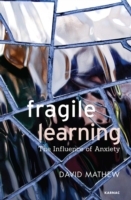-
Zusatztext
-
What are the barriers and obstacles to adults learning? What makes the process of adult learning so fragile? And what exactly do we mean by Fragile Learning? This book addresses these questions in two ways. In Part One, it looks at challenges to learning, examining issues such as language invention in a maximum security prison, geography and bad technology, and pedagogic fragility in Higher Education. Through a psychoanalytic lens, Fragile Learning examines authorial illness and the process of slow recovery as a tool for reflective learning, and explores ethical issues in problem-based learning. The second part of the book deals specifically with the problem of online anxiety. From cyberbullying to Internet boredom, the book asks what the implications for educational design in our contemporary world might be. It compares education programmes that insist on the Internet and those that completely ban it, while exploring conflict, virtual weapons and the role of the online personal tutor. The book also examines the issue of time as a barrier to learning and its links to unconscious thinking, as well as defining fragility in a summative essay.
-
-
Kurztext
-
What are the barriers and obstacles to adults learning? What makes the process of adult learning so fragile? And what exactly do we mean by Fragile Learning? This book addresses these questions in two ways. In Part One, it looks at challenges to learning, examining issues such as language invention in a maximum security prison, geography and bad technology, and pedagogic fragility in Higher Education. Through a psychoanalytic lens, Fragile Learning examines authorial illness and the process of slow recovery as a tool for reflective learning, and explores ethical issues in problem-based learning. The second part of the book deals specifically with the problem of online anxiety. From cyberbullying to Internet boredom, the book asks what the implications for educational design in our contemporary world might be. It compares education programmes that insist on the Internet and those that completely ban it, while exploring conflict, virtual weapons and the role of the online personal tutor. The book also examines the issue of time as a barrier to learning and its links to unconscious thinking, as well as defining fragility in a summative essay.
-
Detailansicht
Fragile Learning
eBook
ISBN/EAN: 9781781815168
Umbreit-Nr.: 9980224
Sprache:
Englisch
Umfang: 272 S.
Format in cm:
Einband:
Keine Angabe
Erschienen am 19.08.2015
Auflage: 1/2015
E-Book
Format: EPUB
DRM: Adobe DRM


